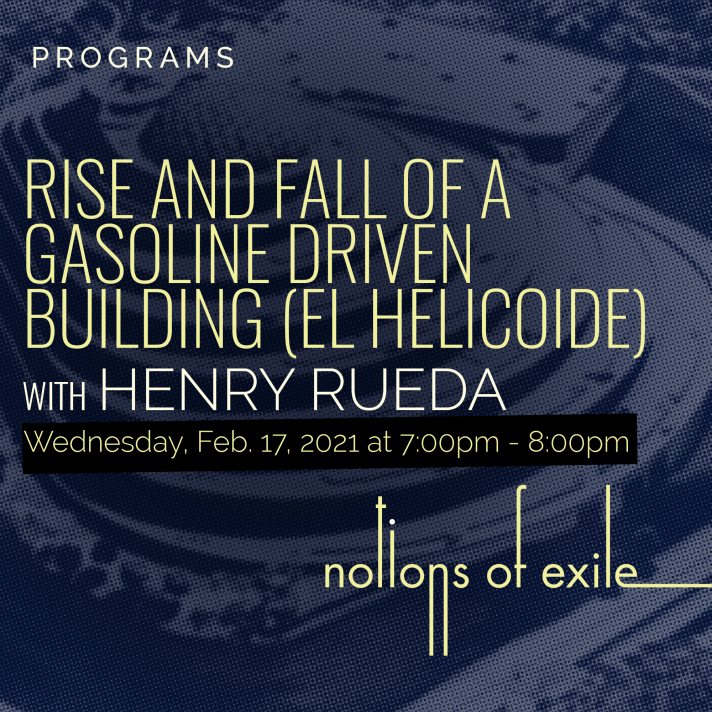Rise and Fall of a Gasoline-Driven Building (El Helicoide) with Henry Rueda
Virtual

Architect and scholar Henry Rueda discussed how major infrastructure projects and automobile culture impacted the city of Caracas using El Helicoide as a case study. El Helicoide is a massive building project started in 1956 and located on a prominent hill of Caracas. Although it has been occupied by multiple governmental agencies, its construction was never completed, and the original program faded with the socio-political developments of the country. Currently, it is used as a makeshift facility for political prisoners.

Watch the recording from this program here.
About the presenter
 Henry Rueda holds a degree in architecture from the Central University of Venezuela and a Master’s in Advanced Architectural Design from the Graduate School of Architecture, Planning, and Preservation at Columbia University. He has taught at José María Vargas University, Central University of Venezuela, and Simón Bolívar University. His professional experience includes working for Jesus Tenreiro in Caracas, and Wiel Arets in Maastricht. Rueda’s current work focuses on single family residences in different cities in Venezuela and in Miami. In 2014, his VL House was nominated for the Emerging Architects Mies Crown Hall Prize of the Americas, organized by the Illinois Institute of Technology in Chicago.
Henry Rueda holds a degree in architecture from the Central University of Venezuela and a Master’s in Advanced Architectural Design from the Graduate School of Architecture, Planning, and Preservation at Columbia University. He has taught at José María Vargas University, Central University of Venezuela, and Simón Bolívar University. His professional experience includes working for Jesus Tenreiro in Caracas, and Wiel Arets in Maastricht. Rueda’s current work focuses on single family residences in different cities in Venezuela and in Miami. In 2014, his VL House was nominated for the Emerging Architects Mies Crown Hall Prize of the Americas, organized by the Illinois Institute of Technology in Chicago.
About this project
Notions of Exile is a virtual exhibition and series of programs, co-curated by Fabiola R. Delgado and Faride Mereb. The project explores the cultural influence of the largest recorded refugee crisis in the Americas—the forced migration of six million Venezuelans from their homeland—using Venezuelan writer and journalist Aquiles Nazoa’s stories of exile and migration as a metaphorical “table” around which the co-curators have gathered artists from Venezuela and its diaspora. The participants include Génesis Alayón, Leonardo Almao, Miguel Braceli, Deborah Castillo, Alexander Chaparro, Gabriela García, Mercedes Golip, Samoel González, Franklin Hurtado, Diana López, Henry Rueda, Henry Solórzano, Ugo Ulive, Graciela Yáñez Vicentini, and Luis Moreno Villamediana.
